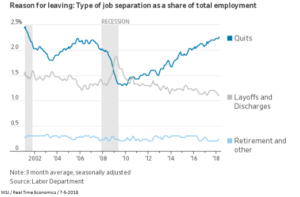HIGHLIGHTS
- Markets move up around the world.
- Make it official, the trade war is now underway.
- Strong jobs report as 213,000 are added to payrolls.
- Workers are leaving their jobs at the fast pace in 17 years, confident that they can find better work elsewhere.
MARKET RECAP
The “official” start of the trade war apparently was not a concern to investors, as stocks rallied around the world this week. US equities were up by 1.68% and international stocks advanced by 0.35%. Bonds were up by 0.31% and oil fell by 0.47%. A strong US economy buoyed by a solid jobs report was enough to move stocks higher. The 2-10 yield curve narrowed to 28 basis points, the smallest gap since 2007.
TRADE WAR
You can say that the trade war is now official as the US imposed $34 billion in tariffs on imported Chinese machinery, auto parts, and medical devices. China said it will respond in kind on soybeans and sport-utility vehicles. Oxford Economics estimates that the $50 billion in tariffs will reduce growth by 0.1% in each country. Add on another round of $200 billion and knock off 0.3% in 2019. But there are likely to be add-on effects from reduced confidence, slowing investment, less efficient supply chains, etc.
The US and Canada imposed tariffs on beef and farm goods. The European Union threatened tariffs on $300 billion in products if the US imposes automotive tariffs. Trump talks about exiting the World Trade Organization.
For now, though, markets are mixed on the ultimate outcome, many believe it will all work out in the end with limited short-term damage and longer-term benefits. Trump is counting on a strong US economy to give him greater leverage and to force concessions from trading partners.
The tariffs are not enough to do real damage, at least not yet. But what happens if countries go back and forth and each side raises the stakes and the trade war dramatically is amplified. At a minimum, what might a much deeper trade war lead to? For one, you would get higher prices. Higher prices might lead to a more aggressive Fed meaning higher interest rates. And remember, these increased prices and interest rates would not be due to a stronger economy, we are talking about self-inflicted wounds. Higher prices will reduce demand for products and higher interest rates will hurt debt-heavy companies, both might lead to job cuts. Higher inflation, higher interest rates, job cuts…that sounds like the end of an expansion. Beware the Law of Unintended Consequences.
JOB MARKET
Employers added 213,000 jobs in June. Unemployment rose to 4.0% from 3.8% but that was due to 601,000 new entries into the workforce. That is considered good news. Given the strong job market, and theoretically greater demand for workers than supply, the new entries should soon find work and further help an already solid economy. Average hourly earnings rose 0.2% and 2.7% year over year, indicating that labor costs are still under control.
In a sign indicative of a tight job market, workers are now leaving their current jobs at the fast rate in 17 years, a signal that they feel confident in the ability to find more satisfying work at a higher pay.
SCOREBOARD


